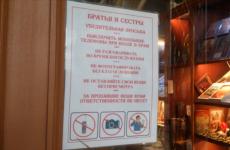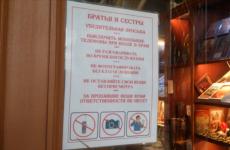Why you can’t eat with forks at a wake: signs. Why you can’t eat with forks at a funeral dinner. When are spoons served at a funeral?
Funeral ceremonies have quite ancient traditions, much of which is incomprehensible to modern people. The tradition of eating a funeral meal arose in ancient times, but then people ate directly above the grave. Later, this ritual was moved to a more civilized place, although its original meaning was preserved.
Today, few can give an exact answer why you cannot eat with a fork at a funeral. The Church says it is okay to use a fork at a funeral dinner. However, when holding funeral dinners, this cutlery is never used. Where did this superstition come from?
Traditional versions: Why can't you eat with a fork at a funeral?
There is one fairly plausible explanation. We all know that the canonical funeral meal consists of three dishes: kutia, pancakes and jelly. Eating kutya with a fork is quite inconvenient, especially since the funeral meal should begin with everyone present eating exactly three spoons of kutya.
Pancakes are supposed to be taken with your hands, but for jelly you need a glass or mug. There is no need to pin anything. Bread and other dishes were broken and taken by hand, so forks were not used at the funeral meal as unnecessary.
A version rooted in paganism explains why forks should not be used at funerals. During pagan times, it was customary to lay down all weapons, including piercing and cutting weapons, at the entrance to the room where the funeral meal was held. Apparently, since those times it was not customary to put anything on the table that could be used as a weapon.
Another version says that the purpose of the funeral was to feed the poor and beggars, who, in gratitude for the food, would pray for the soul of the deceased. This category of people simply did not know how to use forks, so everyone was served spoons. By the way, the deceased’s belongings were also distributed to the poor in exchange for prayers. It was believed that the more people prayed for the deceased, the faster his soul would go to heaven.
Kutya must be present at the funeral meal. Kutya symbolizes the sweetness of the Kingdom of Heaven. The belief says that by poking the kutya, you can “prick” the deceased and disturb his peace. This belief explains why you should not eat with forks at funerals.
The next version is similar to the previous one. Esotericists say that during a funeral meal, the soul of the deceased is with loved ones at the same table. If there are forks and knives around, the astral body of the deceased can easily be hurt. They pierce the spirit like spears, wound it, and cause significant damage to the soul of the deceased.
In Soviet times, wakes were held in canteens, where the only cutlery available was spoons. Probably from that time on, the belief began that it was sinful to use a fork at a funeral.
Household versions: Why can't you use forks at funerals?
According to one version, in Rus' they invariably ate with spoons. Forks appeared during the reign of Peter I, who adopted this custom from Europe. Many of the ruler's innovations were met with hostility by the people, and new cutlery was no exception.
Old Believers rejected forks, calling them demonic and devilish weapons, because they resembled the devil's trident and a sharp devil's tail. At the same time, people called Peter I the Antichrist, intending to destroy the Christian souls of the Russian people. Therefore, during meals, people continued to use spoons exclusively.
This applied not only to funerals, but also to everyday life. In some Old Believers communities, which reacted very sharply to the proposal to introduce the “devilish” cutlery into use, they still use only spoons.
Why can't you use forks at funerals? Since ancient times, forks have not been used at funerals to avoid injury. Many relatives of the deceased came to the funeral, especially if the person was rich and influential during his lifetime.
The fact is that their direct goal was not at all to pay tribute to the deceased and remember the deceased. Often, the division of property began already during the funeral meal. Each of those present wanted to grab a share of the rich inheritance. Relatives, inflamed by drinking, began to lay claim to the wealth.
Often the discussion went beyond mutual insults, and the swearing escalated into a mass brawl. The presence of piercing and cutting cutlery at the funeral table threatened their direct use in the fight, and, as a result, injuries and severe cuts.
This is why you can't eat with a fork at a funeral. Agree, causing serious injury or killing with a spoon is quite problematic. This is the only reasonable explanation for this tradition.
The Orthodox Church does not consider it a sin to use forks at a funeral meal. The clergy say that it is much more important to conduct a funeral service for the deceased and perform funeral rites according to all the rules. The funeral table should be set on the first, ninth and fortieth day after the burial, and the relatives of the deceased should decide whether to serve the table with forks or not.
The space between paganism and Orthodoxy was densely filled with popular superstitions. They make life easier: you don’t have to think, just do it one way or another, spit over your left shoulder, knock on wood, don’t look into a broken mirror and don’t spill salt. Why is that? The most common opinion is that my grandmother said so.
And these “grandmother’s tips” are implemented in different areas of life, a huge number of them are related to the topic of death. In this article you can learn in more detail about funeral superstitions and whether these traditions have anything to do with Orthodoxy. Is it necessary to cover mirrors and provide bread and vodka for the deceased? Why do people eat with spoons at funerals?
Why are the dead buried?
Christianity is a religion of life, not death. Therefore, it speaks of death not as the end of existence, but as a hope for eternal life, a transition to another world.
After bodily death, the soul does not disappear anywhere, because it is immortal. So Christianity says that the time will come when the human body will be resurrected. When it will be? After the Second Coming of Christ. All the dead will rise, and they will rise not only mentally, but also physically. Man will remain bodily in heaven and in hell. Where such confidence? Christ Himself set an example for humanity: He ascended to heaven in both body and spirit.
According to the Apostle Paul, the human body is nothing more than a temple of the Holy Spirit, a shrine. That is why Christians bury the dead piously: they wash the body, dress it in funeral clothes, put it in a coffin and bury it. Unfortunately, today many folk funeral superstitions have been added to the pious burial rite.

Belief in eternal life is reflected even in the etymology of the word "deceased"- fallen asleep, retired, and not sunk into oblivion. Therefore, Christians do not erase the names of the deceased from their memory. On the contrary: they remember them, pray, thank them for all the good things.
For those who have passed on, it makes no difference how you conduct the wake, whether you cover the mirrors, whether you wear black and mourn for at least a year. But he cares whether you pray for him. The main emphasis is on prayer and alms, and not on those strange things that supporters of popular superstitions continue to do.
To make it easier for you and your relatives to part with funeral prejudices, we will consider the most striking, hypothetical stories of their origin and debunk “old wives' tales” from a Christian point of view.
Why do they hang mirrors in the house of the deceased?
Experienced priests admit: over the years of their pastorate, they have not met a single house or apartment where they were called for a funeral service, in which all the mirrors were not hung. If you ask: “Why did you do this?”, then the top three most popular answers will be: “Everyone does it this way,” “That’s what my grandmother said,” “So that the soul of the deceased, seeing himself in the mirror, is not afraid / So that relatives, seeing him in the mirror they were not afraid of the passing soul.”

How can a Christian who believes in God and an afterlife believe such nonsense? It's probably not a matter of a soul flying over the mirror, but something else.
They say that many centuries ago, when a loved one died in a rich man’s house, relatives hung sparkling chandeliers, furniture, and decorative elements with black fabric. Why did they do this? The sparkling interior distracted them from praying for their loved one; in order to concentrate, the relatives removed all the “irritants.”
Today this tradition has become obsolete. It is completely incomprehensible why those who do not have huge crystal chandeliers and expensive shiny furniture in their homes hang up mirrors. The new context of this story with the reflection of the soul in the mirror is nothing more than an ingrained superstition.
Money and his favorite things should be placed in the coffin of the deceased.
People try to fit earthly passions and financial schemes even into the afterlife. To ensure a comfortable stay for the deceased in the next world, they put telephones, money, favorite clothes, and so on in the coffin.

Why does a dead man need money? Do dollars or euros have value in eternal life? Some people give this explanation for the popular superstition: so that the deceased can pay to enter heaven. Doesn't remind you of anything? In Greek mythology, a person could not easily get into the Kingdom of the Dead; to do this, he had to swim across the River Styx. The cab driver Charon helped to cross to the other side, and so he was paid for the services rendered.
In many ancient civilizations, favorite things, food, clothes were also placed in a coffin or crypt; it even went so far as to kill a wife, concubines, and servants in order to ensure a carefree stay for a person beyond the coffin.
But does a dead man need money? There is no way to buy a place in heaven, because people get there only for a righteous life and sincere repentance of sins.
Does the departed person need another mobile phone, a favorite toy or expensive clothes? What is this: folk superstitions in a new way? An immortal soul will not need food, fashionable clothes or communication items. She finds herself in a world where there is no space and time. The soul, as an immortal substance, simply does not need food, clothing and luxury items.
It is better to distribute these items to those in need. Almsgiving is considered one of the effective types of assistance to the deceased.
The deceased's belongings must be burned.
Is it necessary to burn the deceased's belongings? Many say yes, because along with these things a certain energy is transmitted. For those who especially defend this popular superstition, we advise you to burn your grandmother’s apartment, your father’s savings and your mother’s jewelry. Usually, when it comes to something valuable, people take back their words.

If a person dear to you has passed away into eternity and you are trying to quickly get rid of bitter memories and everything that tears your heart, do not rush to burn everything. It's better to give things away to those in need.
Usually only towels after washing and the bed on which the deceased lay are burned. Why not give the clothes that he wore during his life to others? You can keep something as a keepsake.
Is there any more or less logical explanation for the funeral superstition for those who like to burn?
It can be assumed that during infectious epidemics it was desirable to set fire to the things of the dead so that these objects would not cause infection to others.
You can find a second explanation for lovers of magic. Things carry a certain energy. And if a person was sick for a long time, then, accordingly, he attracted negative energy to himself. What if the deceased previously suffered from some kind of mental disorder? A Christian should not be afraid of this. And if any doubts still arise, you can always pray, cross things and sprinkle them with holy water.
Why do people eat with spoons at funerals?
Surely you have seen this picture more than once: a memorial dinner for the deceased, and only spoons were used as cutlery.
Under no circumstances should you use knives and forks! So why then put baked meat or pancakes on the table, which you can hardly handle with just a spoon?
Historians explain this deep-rooted funeral superstition with the reforms of Peter I. It was under this emperor that the tradition of using a fork and knife appeared. But the Russian people did not like both objects: the knife was also associated with a murder weapon, and the fork was a devil with horns. The spoon seemed much more harmless.
The second version is related to the possibility of redistribution of the property of the deceased. Allegedly, different relatives will come to the wake; they may not agree with the will. That’s when the piercing and cutting ones will come into play.
Another option for explaining the popular superstition: if you commemorate with vodka, then after a second or third glass someone may accidentally hit a neighbor. Or do it rashly, under the influence of alcohol.

It is also customary to cook for a funeral kolivo- a ritual dish of wheat or rice with honey and dried fruits. The most convenient way to eat this kutya is with a spoon. Lovers of superstitions also found their justification: if you pierce a stake with a fork, the deceased will feel bad.
What can you say in these situations? A wake is an opportunity to combine two types of help for the deceased: prayer and alms (funeral dinner). You shouldn’t turn them into a quarrel between heirs or a drinking party for everyone. Alcohol and excess food should be avoided in favor of time for reminiscing and prayer.
The deceased will not care whether you serve 10 dishes or 25; when serving, you use only spoons or also forks and knives. If you also care about the convenience of your guests, then forks will definitely not hurt. Popular superstitions with a ban on the “horned” device definitely have nothing Christian.
After the deceased, the house needs to be rededicated
For the first man, death was something unnatural, and it entered the world only after the Fall.
For many saints, departure to another world was a joyful event - a Christian finally met God. The Liturgy was celebrated at the graves of the first Christians, in the catacombs. To this day, the Liturgy is celebrated on the relics of the martyrs. Not everyone knows about this, but in the altar a special quadrangular board is laid on the altar, into which a piece of the relics of the martyrs is sewn. This board is called antiminsom.
Even those far from the Church respect the remains of saints, and believers venerate them as the greatest shrine. As already mentioned at the beginning of the article, during the Second Coming of Christ all people will be resurrected in their bodies.

So why are we so afraid of living in a house where the body of a deceased person was located for some time? Do we consider such a stay a desecration of the home? Are we calling a priest to re-bless the house?
How to overcome these and other folk superstitions associated with funeral themes? Christian life. If a person becomes Orthodox not nominally - he was baptized in childhood - but in practice, then the place of prejudices and pagan rituals is replaced from his life by prayer, mercy, and love. Or common sense.
Superstitions associated with funerals and cemeteries are also discussed in this video conversation with a priest:
Take it for yourself and tell your friends!
Read also on our website:
show more
Modern people have many questions related to ancient customs - why you can’t eat with forks at a funeral, whether to drink alcohol at a mournful meal, whether pregnant women should attend it, and many others. Below you will find explanations of all existing funeral beliefs.
Table signs
Before the reign of Peter the Great, the Russian people generally ate only with spoons. The appearance of forks on the tables did not cause delight. They were compared to the devil's tails and pitchforks, which are used to torture sinners. People who were especially attached to old ways of life believed that the appearance of this cutlery was another tool "king-antichrist" against Christian souls.
Over time, the fork still took root in Russia. But they still didn’t use it at wakes because of its “satanic” appearance. This tradition has survived to this day. In Old Believers communities, to this day they only eat with spoons.
Another reason for the absence of forks on the funeral table is the fear of disturbing the peace of the deceased. The fact is that kutia, one of the obligatory treats, symbolizes the Kingdom of Heaven. If you poke ritual food with a knife or fork, you can disturb the dead. However, most funeral dishes are not very convenient to eat. Traditionally these are kutia, pancakes and jelly.
Popular beliefs, as we know, are often rational. Thus, the use of sharp cutlery can be explained as an attempt to prevent fights with stabbings. Even the most distant relatives come to the wake, who may not miss the chance to recall old grievances to each other. In addition, in the old days, the division of inheritance began almost immediately.
From a bioenergetics perspective, energy drains from the sharp ends of forks and knives. Therefore, the ban on their use is caused by the need to protect those who remember from energy attacks. The astral body of the deceased may be close to loved ones, and such an attack can cause pain to him too. It is known that the energy at funerals and wakes is not very positive.
By the way, despite the superstitions that circulate among the people, the church allows the use of a knife and fork during the funeral meal.
Alcohol superstitions - remembering alcohol

A glass of vodka near the portrait of the deceased and the statement that You need to drink at least one glass for the peace of your soul- everyone knows all this. However, is it possible to drink alcohol at a wake? Where did this tradition come from?
The Church has a negative attitude towards drinking at funerals. This applies to vodka, wine, and other alcoholic drinks. Thus, wine is a symbol of earthly joy, which is inappropriate at a funeral meal. Eyewitnesses who have been in the next world said that the suffering of a person who was killed by alcohol increases many times over.
It is not difficult to understand why it is impossible to commemorate with vodka from a Christian point of view. Alcoholism is a sin, but the relatives gathered at the table in order to contribute with their kind words and prayer to the forgiveness of the sins of the deceased. It is not permissible to ask God for forgiveness and sin at the same time. People say that God punishes the children of those who drank wine or vodka at the funeral table with alcoholism.
The tradition of drinking alcohol at cemeteries, funerals and wakes is not a tribute to ancient traditions, but a relatively modern stereotype. He had already acquired various beliefs, for example, that one should not clink glasses at a mournful feast. So is it possible to drink at a wake when almost everyone does it? We advise you not to do this. There are not even ancient signs on this topic, because it never occurred to our ancestors to drink alcohol at a funeral meal.
Is it possible to take food home?
It is known that food from the cemetery is not eaten. This is to some extent allowed only to those who have no other way to obtain food other than to take a memorial from the grave. But is it possible to take food home from the funeral?
 The food from the funeral table is intended to feed as many people as possible. It is customary to distribute the leftovers to those in need. This food does not carry any negativity. It was prepared so that people could treat themselves and during the meal remember the bright deeds of the deceased during his lifetime.
The food from the funeral table is intended to feed as many people as possible. It is customary to distribute the leftovers to those in need. This food does not carry any negativity. It was prepared so that people could treat themselves and during the meal remember the bright deeds of the deceased during his lifetime.
You can also give food to those who came to honor the deceased with them. Was something handed down for you from a wake where your loved one was present? Help yourself, remember the deceased person, wish him peace. True, there is one “but” here. Witchcraft is often performed on funeral dishes for various purposes. Therefore, do not take them from the hands of those who may wish you harm.
If there is anything left after the feast, you can take the treats with you. But you can’t throw them away; it’s better to give the leftovers to the animals.
During the mournful meal, a portrait of the deceased is displayed, and next to him - a glass of water and a piece of bread. Anyone who drinks or eats his treat will get sick and die soon. It should not even be given to animals.
Funeral menu - about sweets and more
Distributing sweets on funeral days is an old tradition. This is often done in cemeteries; do not be afraid of such gifts.
 You cannot eat only those treats that you have previously lay on the graves. Such sweets are intended for the deceased. Traditionally, only people living in need can take them.
You cannot eat only those treats that you have previously lay on the graves. Such sweets are intended for the deceased. Traditionally, only people living in need can take them.
Concerns may be caused by the fact that any funeral dishes, including sweets, can be cast with a love spell or damage. Therefore, you should not eat what was received from the hands of a person who may wish you harm. Strangers with sweets often do not need to be frightened - they are simply observing an ancient funeral tradition.
Should pregnant women go to funerals?
It is known that they are not recommended to go to the cemetery and attend funerals. They should not go to the wake, which, in fact, is a logical continuation of the funeral. The energy there is still the same - grief, death, grief. If it is possible to refuse remembering, it is better to do so. If farewell to the deceased can be considered a necessary event, then a wake is no longer there.
 The biofield of a pregnant woman is poorly protected. But she is responsible not only for herself, but also for the child. Feeding on its energy will not be at all against the essence, which is attracted by the strong negative emotions of a large number of people.
The biofield of a pregnant woman is poorly protected. But she is responsible not only for herself, but also for the child. Feeding on its energy will not be at all against the essence, which is attracted by the strong negative emotions of a large number of people.
The Church does not prohibit pregnant women from going to memorial dinners, funerals and cemeteries. However, it does not oblige you to do this. If your health does not allow you to be present, you can visit a church instead of a cemetery, light a candle for the repose of your soul, and order a prayer service.
Other superstitions at funerals
It is extremely important to observe folk signs at funerals. The quality of the afterlife of a person who has passed into another world depends on this. So, at a memorial dinner, one is supposed to remember only his good deeds and character traits. Leave the discussion of the shortcomings. About the dead - either good or nothing. This proverb was not invented for nothing.
 Signs after a funeral advise, upon returning from the cemetery, to warm your hands over the flame of a candle, preferably a church one. But after the cemetery they usually go straight to the funeral. Before eating, you are supposed to wash your hands, and this rule replaces the candle omen. Don't worry about eating a piece of dead energy. When washing your hands, water will wash it away.
Signs after a funeral advise, upon returning from the cemetery, to warm your hands over the flame of a candle, preferably a church one. But after the cemetery they usually go straight to the funeral. Before eating, you are supposed to wash your hands, and this rule replaces the candle omen. Don't worry about eating a piece of dead energy. When washing your hands, water will wash it away.
A wake is not a time for tears. You cannot cry a lot for the deceased, otherwise he will choke in the afterlife. Laughing is also not recommended. Anyone who laughs at a wake will soon shed many tears.
In general, there are many funeral signs. Some of them are relatively recent, but most superstitions are hundreds, if not thousands of years old. They are intended to teach the correct behavior of those who remember, because it determines where the soul of the deceased will go after death.
Orthodox memorial traditions concern not only days and dates, but also some conventions of the ritual. One of them is that only spoons are placed on the funeral table. To answer the question why you can’t eat with forks at a wake, you need to look into history. One of the historical prerequisites for why you don’t eat with forks at a wake can be considered an exclusively everyday fact - in Rus' they didn’t use forks at all until the time of Peter the Great. It was the first Russian emperor who introduced forks into use, and before that, even in boyar houses they used only spoons.
Like any innovation, forks aroused hostility; they were even called demonic weapons by analogy with the devil’s trident or the devil’s tail. This rejection was especially acute among the Old Believers; in their communities they still eat only with spoons. Another version of why forks should not be used at funerals is ordinary human greed and impulsiveness. Close relatives of the deceased person come to the funeral dinner; often the division of the inheritance begins right there, which in the heat of the moment can end in a knife fight.
Representatives of the Orthodox Church have said more than once that the use of forks does not in any way contradict church canons. For clergy, it is much more important to conduct a funeral service and observe the funeral ceremony.
The question of why forks are not used at funerals has nothing to do with the church and its rituals. The most likely of all the reasons for not using forks at funeral dinners is the tradition of eating kutya as the first dish at funerals.
Pancakes were also prepared for the wake, and dishes with bread and jelly were placed. For all these dishes, a fork is simply not needed, which is why it was not placed on the table.
Video: Bracelet and ring made of rubber bands “Forget-me-nots” DIY video tutorial
Video: I can't go to Beldyazhki!
Video: what men talk about shish kebab
- Over the course of many centuries, ancient signs and superstitions have become more and more firmly rooted and strengthened in our lives. Many of them have already become firmly established in our habits, and often we......
- Sometimes the celebration of memorable dates has to be postponed to a more convenient time. But why is it possible to celebrate anything in advance, except for a birthday, which cannot be postponed to an earlier date?......
- There is an unspoken rule that says that you cannot take photographs in the cemetery: neither people, nor the procession, nor monuments - nothing. Let's try to figure out what is the reason for this ban.......
- It is probably impossible to meet a person who does not look at himself in the mirror at least once a day. Today it is an indispensable attribute of the interior, which is used to decorate premises not only...
- Many people bring souvenirs from different trips, including incredibly beautiful peacock feathers. There are people who refuse to buy, given the sign that explains why feathers should not be kept at home......
- Many people love to enjoy the beauty of the moon, while others associate its image with romantic encounters. Why is there an opinion that you should not look at the moon and what can happen if you violate......
- A large number of signs have come down to us that are associated with various life phenomena. Now we will look into one superstitious prohibition, why you can’t eat from a knife and why it can......
- Folk signs remain relevant in our age of high technology and rapidly developing progress. Many of them relate to everyday life. The wisdom of generations lies in short warnings......
- Doctors say eating at night is an important factor that negatively affects your figure. However, not everyone succeeds in figuring out how not to eat after 6 pm on a diet, which leads to......
- After Palm Sunday, Holy Week begins, during which the strictest fasting should be observed. Many believers take into account the prohibitions, considering this an opportunity to cleanse themselves and prepare for the great holiday. Important......
- In pursuit of a beautiful body, girls often forget about the physiological needs of their own body and selflessly test all kinds of diets and fasting days on themselves. Answering how to lose weight during......
Sooner or later, every person in his life comes into contact with such a sad ritual as a funeral.
For a long time, many superstitions and signs have been associated with this sad ritual.
Indeed, at the moment of farewell to the deceased, we come into direct contact with the unknown and terrible world of shadows, which, if behaved incorrectly, can greatly harm those remaining on earth.
The meaning of the funeral rite
The wake is a special part of the funeral ceremony. Its meaning is to use a kind of alms to thank the people who came to see off the deceased on his final journey, and at the same time remember all the good things that remained on earth after the deceased.
The tradition of a funeral meal appeared in ancient times, when food was eaten directly over the grave. Over time, the ritual was transferred to more civilized conditions, but its original meaning has been preserved to this day. It contains several basic conventions, among which one of the main ones, along with special funeral food, remains the prejudice that there should be no forks and knives on the table.
What does this convention mean?
Excursion into history
In order to understand one of the meanings of the tradition of refusing forks, you need to know some historical facts.
In Rus', in pre-Petrine times, spoons were used exclusively in the houses of boyars and ordinary people. Peasants ate with wooden products, and wealthy and wealthy citizens used silver and even gold cutlery.
After the forced introduction of the “sharp-toothed” object into use, many conservatives continued to be wary of it, and the Old Believers even compared it to a pitchfork, the devil’s favorite weapon.
Security Considerations
Along with a knife, a fork is a rather traumatic object that can cause serious injuries. Therefore, far-sighted relatives still prefer to do without these cutlery at funerals. After all, it is often during the wake that a discussion of inheritance plans begins, during which disagreements often arise, sometimes turning into a real fight. In such a situation, having a fork or knife at hand can be a dangerous proximity. After all, in the heat of a quarrel, relatives overwhelmed by greed are capable of any rash act, including self-harm.
Church canons
Christians do not approve of taking various signs seriously, considering superstition one of the sins that should be fought. Any Orthodox priest will explain that for a true believer, the exact observance of rituals during funerals and memorial services is much more important. And the presence of knives and forks at dinner has nothing to do with church traditions and rituals.
Practical reasons
The most likely explanation for the sign lies in a very prosaic plane. At any funeral dinner, the first and most important thing is a sweet ritual dish called “kutia”. It is prepared from rice or millet cereals with the addition of raisins. It is very inconvenient to pick up such food with a fork, so it is simply not needed. In addition, using a spoon is much more convenient for tasting other traditional funeral table dishes, such as jelly with bread or pancakes.
Esoteric explanation
Mystically minded people are sure that during the wake the soul of the deceased is among the people gathered at dinner. When there are so many sharp instruments around, such as forks and knives, it is very easy for the esoteric essence of the deceased to cause pain with the help of them. Sticking like bayonets or spears, the points of the forks cause irreparable damage to a person who has passed into another world.
....






